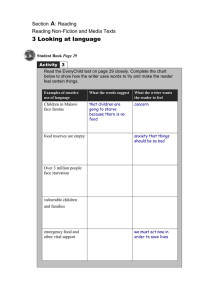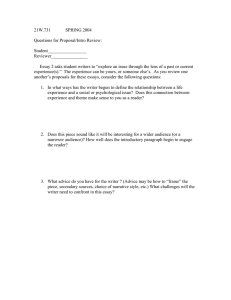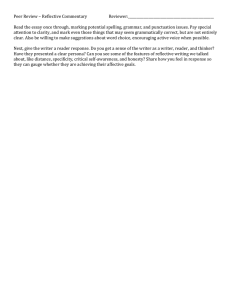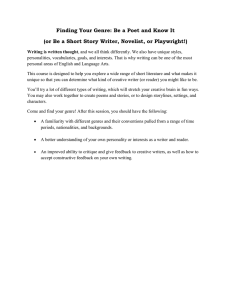Guidelines for Conference 1 you should practice you talk with someone.
advertisement
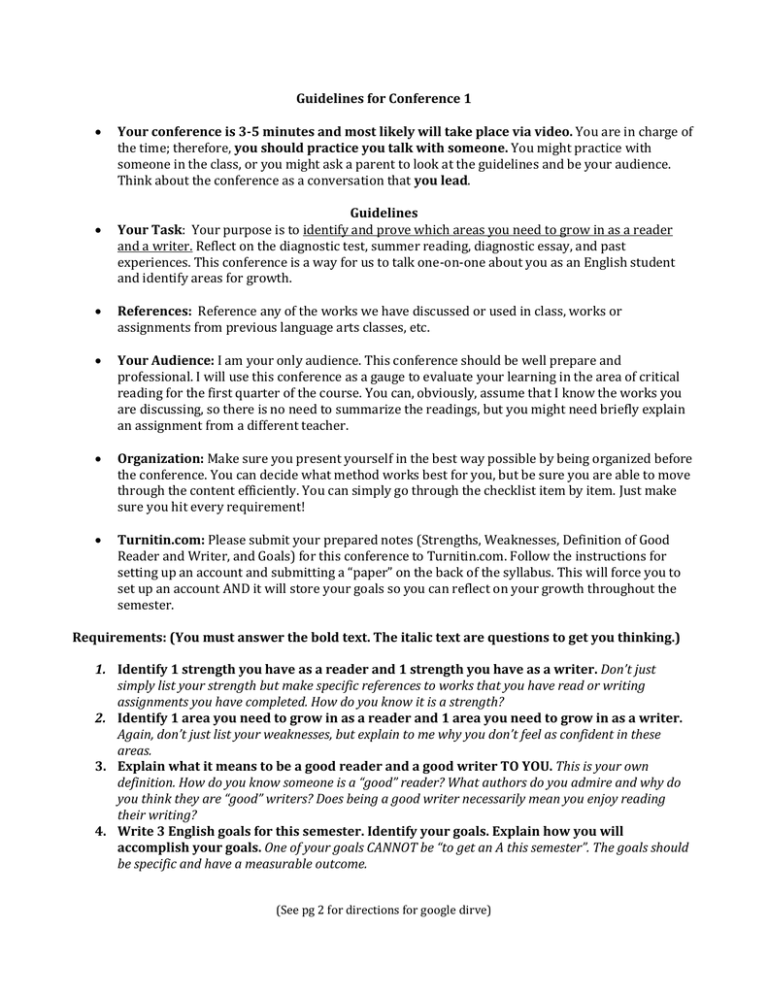
Guidelines for Conference 1 Your conference is 3-5 minutes and most likely will take place via video. You are in charge of the time; therefore, you should practice you talk with someone. You might practice with someone in the class, or you might ask a parent to look at the guidelines and be your audience. Think about the conference as a conversation that you lead. Guidelines Your Task: Your purpose is to identify and prove which areas you need to grow in as a reader and a writer. Reflect on the diagnostic test, summer reading, diagnostic essay, and past experiences. This conference is a way for us to talk one-on-one about you as an English student and identify areas for growth. References: Reference any of the works we have discussed or used in class, works or assignments from previous language arts classes, etc. Your Audience: I am your only audience. This conference should be well prepare and professional. I will use this conference as a gauge to evaluate your learning in the area of critical reading for the first quarter of the course. You can, obviously, assume that I know the works you are discussing, so there is no need to summarize the readings, but you might need briefly explain an assignment from a different teacher. Organization: Make sure you present yourself in the best way possible by being organized before the conference. You can decide what method works best for you, but be sure you are able to move through the content efficiently. You can simply go through the checklist item by item. Just make sure you hit every requirement! Turnitin.com: Please submit your prepared notes (Strengths, Weaknesses, Definition of Good Reader and Writer, and Goals) for this conference to Turnitin.com. Follow the instructions for setting up an account and submitting a “paper” on the back of the syllabus. This will force you to set up an account AND it will store your goals so you can reflect on your growth throughout the semester. Requirements: (You must answer the bold text. The italic text are questions to get you thinking.) 1. Identify 1 strength you have as a reader and 1 strength you have as a writer. Don’t just simply list your strength but make specific references to works that you have read or writing assignments you have completed. How do you know it is a strength? 2. Identify 1 area you need to grow in as a reader and 1 area you need to grow in as a writer. Again, don’t just list your weaknesses, but explain to me why you don’t feel as confident in these areas. 3. Explain what it means to be a good reader and a good writer TO YOU. This is your own definition. How do you know someone is a “good” reader? What authors do you admire and why do you think they are “good” writers? Does being a good writer necessarily mean you enjoy reading their writing? 4. Write 3 English goals for this semester. Identify your goals. Explain how you will accomplish your goals. One of your goals CANNOT be “to get an A this semester”. The goals should be specific and have a measurable outcome. (See pg 2 for directions for google dirve) DIRECTIONS: How to share your video conference on Google drive. The school has a Google drive account for each of you. Your username and password should have been provided for you during the first week of school. With Google Drive, you can share files — like documents, images, and PDFs — without having to email them as attachments. Sharing is as easy as indicating which email addresses or mailing lists should have access to a given file. Share a file with my email address: gina.guzdziol@cusd200.org 1. Go to drive.google.com. 2. Check the box next to the file or folder you'd like to share. 3. Click the Share icon. 4. Choose a visibility option: "Private," 5. Type the email address of the people you want to share with in the text box below "Add people." You can add a single person or a mailing list. 6. Choose the access level from the drop-down menu next to each collaborator: "Can view," "Can comment," or "Can edit." 7. Click Share & save.
